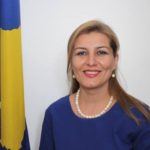- What do you think about the crisis between Kosovo-Serbia? Can you evaluate the reasons for the emergence of the crisis?

The final crises between Kosovo and Serbia have to do with the implementation of the agreement achieved in 2011 in Brussel about Identity Documents (ID) documents and car plates. The crisis started over plans by the government in Pristina to implement reciprocity measures that require people entering Kosovo with Serbian IDs to replace them with a temporary document during their stay in the country, and a plan for Serbian drivers to display Kosovo number plates on their vehicles. Serbia opposed the implementation of the agreement, so Belgrade incited the local Serbs that live in the northern parts of Kosovo to block the roads.
Serbia relaunched some military threats, falsely pretending that Serbian citizens of Kosovo are under attack from the Kosovo institutions. But the roots of the crisis lie in Serbia’s position to not recognize the independence and sovereignty of the Kosovo state and its efforts to block the recognition in the international arena. On the other hand, Serbia for more than 20 years after the war has invested in a frozen conflict in the northern part of Kosovo where lives a population of approximately 50 thousand Serbs, and has continually put efforts, and finances and used its secret services to destabilize Kosovo from inside. The final crisis is the continuity of a destructive policy to undermine Kosovo’s institutions.
- How far do you think the crisis could go? Can KFOR intervene?
I think that KFOR and NATO have made it very clear that any attempt to destabilize Kosovo by the Serbian state will face a strong response by them because it is its mandate in Kosovo to protect peace and security. I believe that this time it strongly delivered this message to the Serbian president Vucic, and he has well understood the message.
So, the situation was very tense this time, and it was necessary that KFOR showed its determination, which was emphasized by NATO’s highest officials later. I foresee other provocations by Serbia in the next months, testing the determination of KFOR to protect Kosovo, so a military response on the table is the option if Serbia would undertake any military action. The other option is that Serbia will continue its destabilization in the north, using the local Serbs for their political agenda.
- What can you say about the reflections of the crisis on the regional countries? Does this crisis have any connection to the Russo-Ukrainian War?
The war in Ukraine has raised concerns in all the Balkan regions about the security issues, and especially the Russian agenda to destabilize the region. Their ally in Balkan is Serbia, which is playing the game; on one hand, has denied the invasion of Ukraine by Russia, and on the other hand, has not accepted to put sanctions as other neighbouring countries have done.
During this period Russia is trying to destabilize Kosovo and Bosnia-Hercegovina through its ally Serbia and local collaborators like Dodik in Bosnia. Russia has used Kosovo independence in its propaganda to justify the occupation of Crimea, the Donbas region, and the proclamation of their independence, as well as the occupation of Ukraine on February 24. Serbia is in a holding position, waiting for the final results of the war in Ukraine, regarding the final agreement with Kosovo, which will be concluded with reciprocal recognition, as a result of the dialogue mediated by the EU.
